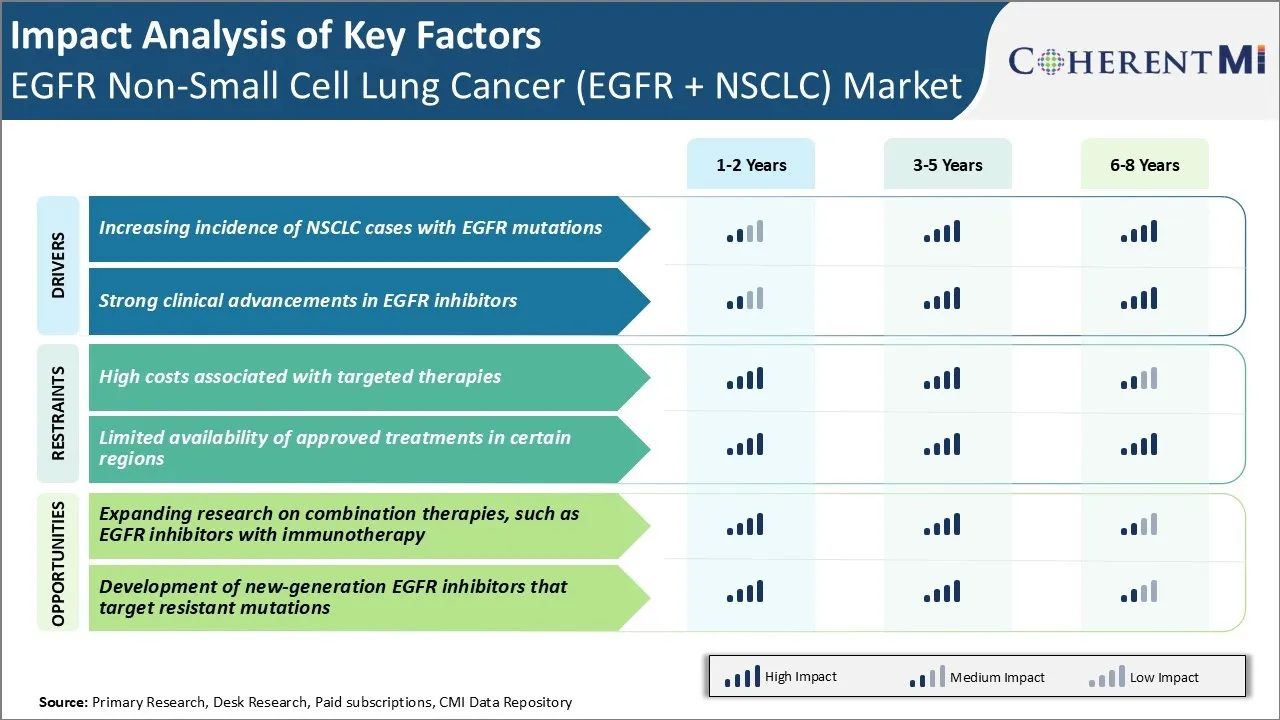EGFR Non-Small Cell Lung Cancer (EGFR + NSCLC) Market Trends
Market Driver - Increasing Incidence of NSCLC Cases with EGFR Mutations
The occurrence of non-small cell lung cancer (NSCLC) cases harboring epidermal growth factor receptor (EGFR) mutations has witnessed a marked rise over the past decade. Statistics show lung cancer is now the most commonly diagnosed cancer as well as the leading cause of cancer death among both men and women in the United States. This genomic alteration is known to drive tumor growth and disease progression in NSCLC patients.
Large epidemiological studies have found the incidence of EGFR mutations to vary between regions and ethnicities. For instance, East Asian countries like Japan, China and South Korea report mutation rates as high as 40-50% in their lung cancer patient pool compared to rates below 10% observed in Caucasian populations. Even within the United States, a higher prevalence of 15-20% is seen among Asian-American NSCLC cases.
A majority of EGFR mutations occur in exons 18 to 21 of the gene which encodes the tyrosine kinase domain of EGFR. Widespread screening combined with growing NSCLC patient volumes has significantly raised the base number of new EGFR mutation-positive diagnoses every year. Rising incidence trend of targetable EGFR mutant NSCLC presents a sizable opportunity for pharmaceutical innovations in this space.
Market Driver - Strong Clinical Advancements in EGFR Inhibitors
The EGFR-TKI class of targeted therapies has emerged as the standard-of-care first-line treatment option for advanced or metastatic NSCLC patients with activating EGFR mutations. Compared to chemotherapy, EGFR-TKIs delivered higher response rates, longer progression-free survival and an improved safety profile and quality of life for patients.
Continued R&D in this field has led to second and third-generation compounds with enhanced efficacy. Osimertinib is a potent, irreversible EGFR-TKI targeting the T790M resistance mutation and was the first drug to demonstrate a progression-free and overall survival benefit over platinum-based chemotherapy in the second-line setting.
In addition to late-stage trials in specialized populations and adjuvant/neoadjuvant use, biomarker-driven studies are optimizing patient selection. Companion diagnostics play a defining role to guide genetic screening and ensure only mutation-positive patients receive EGFR-TKI therapy. Continued scientific progress establishing robust evidence-based treatment pathways from early to late disease has improved outcomes for EGFR mutant NSCLC to the level of a chronic disease for selected patient subsets. This has reinforced the central role of EGFR inhibitors in modern precision oncology practice.

Market Challenge - High Costs Associated with Targeted Therapies
One of the major challenges faced in the EGFR + NSCLC market is the high costs associated with targeted therapies. EGFR inhibitors like gefitinib, erlotinib, and afatinib which are used as first-line treatments for EGFR mutated NSCLC have significantly high costs. For instance, the average wholesale price of erlotinib is approximately $7,000 per month in the United States. The high costs of these targeted drugs pose affordability challenges for a majority of patients, especially in developing countries where the incidence and mortality rates of lung cancer are rising rapidly.
Additionally, the costs put a huge strain on public and private health insurance budgets. While targeted therapies have improved clinical outcomes compared to chemotherapy, the expense involved limits their widespread accessibility and adoption. Drug developers will need to explore strategies to make these life-saving drugs more affordable without compromising on their efficacy.
Market Opportunity - Expanding Research on Combination Therapies
One of the key opportunities in the EGFR + NSCLC market is expanding research on combination therapies, such as EGFR inhibitors with immunotherapy. As monotherapy resistance develops in a majority of patients within a year of treatment initiation, combining EGFR inhibitors with immunotherapies holds promise to potentially delay or prevent resistance development.
Ongoing clinical trials are evaluating the safety and efficacy of combining EGFR inhibitors like osimertinib and gefitinib with immune checkpoint inhibitors like pembrolizumab. Positive results from such studies could establish EGFR inhibitor plus immunotherapy combinations as an important new standard of care.
This will significantly expand the addressable patient pool and market potential for drug developers. Greater research efforts to understand combination therapy mechanisms and biomarkers of response can optimize outcomes for NSCLC patients.